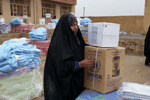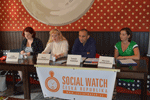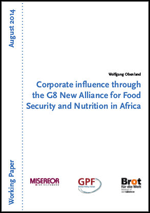Published on Tue, 2014-08-12 10:34
Almost eleven years have passed since the US toppled Saddam Hussain’s regime, and Iraq still continues to struggle. In December 2013, Iraq national security forces stormed the private residence of the Iraqi Finance Minister, arresting several of his staff for supporting terrorism. This incident served as a trigger for sectarian violence throughout the Sunni triangle in southern Iraq – Al--‐Anbar Province. It was one of the areas that led peaceful demonstrations on February 2011, but subsequently witnessed the highest amount of sectarian violence, including government security force attacks on civilians. The recent advancement of Islamic State of in Iraq and Syria (ISIS or Daesh) forces in Mosul and other areas in Iraq has caused great concern about the prospects of peace. Policymakers are scrambling to figure out an appropriate strategy to limit further advancement and prevent further security breakdown. |
Published on Mon, 2014-08-11 09:23
The Arab NGO Network for Development (ANND) and the Arab Organization for Administrative Development (ARADO), in cooperation with ESCWA and the Dag Hammarskjöld Foundation, organized an Arab forum (on the 14-15 and 15 of July 2014) to discuss the challenges to the Post-2015 process and the potential obstacles against addressing the social and economic hardships that the region suffers from. The forum brought about policy recommendations for the relevant regional and international processes,namely: The UNCTAD 50th Anniversary, the UN-GA 69th reunion, the Fourth round of the Economic, developmental and Social Summit of the League of Arab States (LAS). |
Published on Thu, 2014-08-07 12:56
On 30th July 2014 the Czech Social Watch Coalition released the new National Social Watch Report summarizing the development in the year 2013. The title of the report is Czech Republic: Chaos and incompetence in the next year of crisis and it focuses on social development and gender equity, particularly in the following areas: economics, women in politics, social and accessible housing, Roma minority, the lack of community work and human rights agenda in the Czech foreign policy. The publication includes an additional article about the Czech arms export, which is called Czech Republic again equipped dictators with arms in 2013. |
Published on Wed, 2014-08-06 00:00
Some four thousand years ago, King Hammurabi had the laws of his domains between the Tigris and Euphrates rivers carved in stone and placed in front of his palace. The laws were written in the plain language of the people, not in the arcane idiom of the priests, so that everybody could understand them. They were not engraved on clay, so they could not be changed overnight at will, and they were not hidden, so that all were able to access them and learn, for example, that even judges had a duty not to betray the rules in their decisions. |
Published on Mon, 2014-08-04 11:46
In recent times, new partnerships models between governments, business and civil society are increasingly gaining attention. One prominent example is the "New Alliance for Food Security and Nutrition" (G8NA), inaugurated at the G8 summit 2012 in the United States. A new working paper published by Global Policy Forum, Brot für die Welt and MISEREOR, puts a spotlight on how business interests are promoted through the G8NA. To that end, the paper shows how the initiative bundles existing policy initiatives and aligns national policies to corporate interests. The paper concludes that the approach and objectives of the G8NA are highly problematic. The initiative serves as an enforcing mechanism for corporate driven blueprints for agriculture and sidelines national plans and international standards. It is dominated and tailored towards the interests of big corporate actors and is based on a reductionist approach of agricultural “development”. And lastly, the G8NA is poorly institutionalized and disregards fundamental principles of transparency participation and accountability. |








